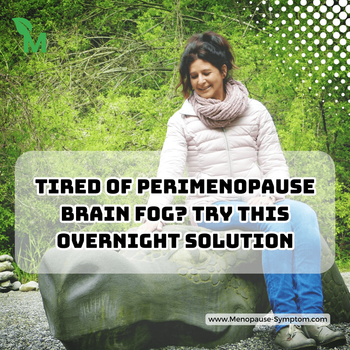Perimenopause: Let's Talk About It
On
06/10/2024Reading time:
4 min
Summary:
Perimenopause is a natural transition in a woman's life, marking the end of her menstrual cycle and the beginning of a new chapter. While many people are still shy about talking about perimenopause, the truth is that being open and understanding about it can bring peace of mind and confidence.
Learn about perimenopause, its characteristics, signs, and how to navigate it in a positive and healthy way.
Perimenopause is more than just a sign of reduced hormone production; it's a process that can last anywhere from a few months to a few years. It can start in your 40s to your mid-50s. Symptoms of perimenopause can vary from person to person and include changes in your menstrual cycle, hot flashes, vaginal dryness, and mood swings. More importantly, these symptoms should not make you feel anxious or embarrassed, instead, they are a natural part of your body's life.
For example, Irregular periods
· Hormonal changes affect the release of eggs from the ovaries and this can cause periods to become late or shorter or stop for a few months. Menstrual bleeding may become lighter or heavier and may occur after the age of 40.
To better understand perimenopause, you should first be aware of the signs. In addition to the physical symptoms mentioned, psychological signs are equally important. Many women may feel anxious, stressed or even depressed. These conditions are completely normal and can be managed through psychological counseling, regular exercise and a reasonable diet.
Diet plays an important role in supporting health during perimenopause. Supplementing foods rich in calcium and vitamin D is extremely necessary to protect bone health, helping to prevent osteoporosis that women often experience after this stage - menopause. Pay attention to the consumption of dairy products, green vegetables and other supplements. In addition, limiting sugary foods and processed foods is also an important factor in maintaining overall health during perimenopause.
Maintaining physical activity is also an effective way to minimize the unpleasant symptoms of perimenopause. Exercise not only improves your mood but also helps you maintain a healthy weight. Gentle exercises such as yoga, walking or swimming are ideal choices. Regular exercise not only improves physical health but also supports your spirit, helping you feel more confident during perimenopause.
In addition, an indispensable factor in facing perimenopause is support from the relationships around you. When we open up to share our worries, emotions and experiences during this period, we will see that we are not alone. Talking to friends, family, or even people online who have similar experiences can provide comfort and connection. Joining a community of women who are going through the same thing can help you find new motivation and feel heard.
Talking about perimenopause also opens up opportunities for research and awareness about different support options. Natural remedies such as herbs, hormone therapy, and relaxation techniques can help many women get through this phase more easily. Talk to your doctor or a specialist to find out which options are best for you.
A key element of talking about perimenopause is a positive attitude. Instead of seeing this phase as a loss, see it as an opportunity for personal growth. Perimenopause can actually be a time when you find new interests and pursue dreams that were previously put on hold. Focus on the positive and find ways to enjoy life more fully.
Setting goals for yourself during perimenopause can also be a fun and motivating activity. You can start pursuing hobbies that you love but have not had time for, such as learning a new language, taking an art class or volunteering for a charity. These activities will not only help you grow as a person but will also help you create memories during this transition period.
Don’t forget that perimenopause is also a time of personal adjustment. It’s a time to reflect on your values and what’s really important to you. Take some time each day to journal or meditate. These quiet moments will not only help you connect with yourself, but will also help you find inner peace.
Finally, inspire others who are going through perimenopause. By sharing your story and what you’ve learned, you can be a source of motivation for them. Not only will this create a connection, but it will also help you realize that you’re not alone in this journey. Everyone has the right and ability to enjoy life and all the good things it has to offer, no matter what stage they’re in.
Overall, perimenopause is not something to be feared or avoided. Face it with courage, positivity, a healthy body and mind, and you will discover that this can be one of the most exciting and enriching times of your life. Instead of keeping quiet about perimenopause, open up and talk about it. Share, learn and support each other to come through this time stronger and inspired. Life is full of good things, no matter what stage you are at.
Source: Team MPS compiled, analyzed and wrote. Please dont reup without source. Many thanks.

Beyond Hot Flashes: A Holistic Approach To Perimenopause
Invalid Date
Perimenopause is an important stage in a woman's life, but not everyone really understands it. Many people only know perimenopause through hot flashes, but in fact, this is a remarkable transition period with many other changes.

Tired Of Perimenopause Brain Fog? Try This Overnight Solution
Invalid Date

Top Slip-Ups In Dealing With Perimenopause Symptoms
Invalid Date
